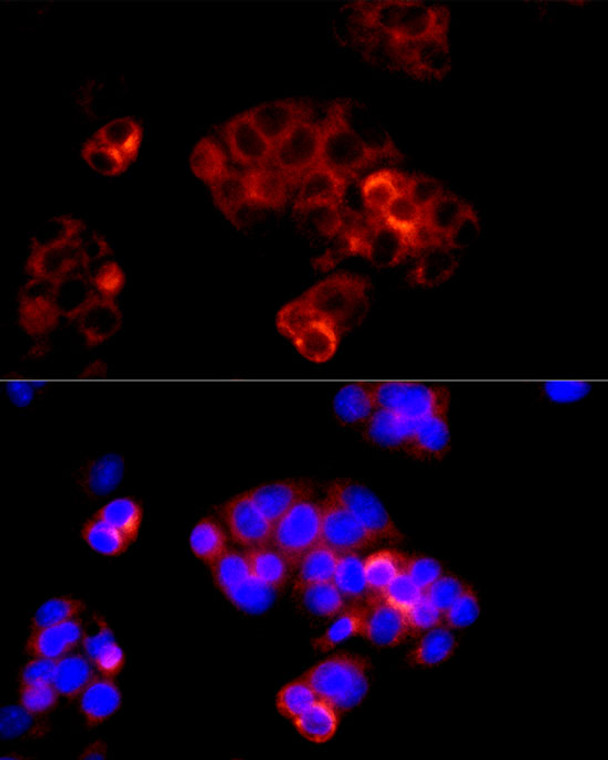| Host: |
Rabbit |
| Applications: |
WB/IHC/IF |
| Reactivity: |
Human/Mouse/Rat |
| Note: |
STRICTLY FOR FURTHER SCIENTIFIC RESEARCH USE ONLY (RUO). MUST NOT TO BE USED IN DIAGNOSTIC OR THERAPEUTIC APPLICATIONS. |
| Short Description: |
Rabbit polyclonal antibody anti-AGT (35-485) is suitable for use in Western Blot, Immunohistochemistry and Immunofluorescence research applications. |
| Clonality: |
Polyclonal |
| Conjugation: |
Unconjugated |
| Isotype: |
IgG |
| Formulation: |
PBS with 0.05% Proclin300, 50% Glycerol, pH7.3. |
| Purification: |
Affinity purification |
| Dilution Range: |
WB 1:500-1:1000IHC-P 1:50-1:100IF/ICC 1:50-1:100 |
| Storage Instruction: |
Store at-20°C for up to 1 year from the date of receipt, and avoid repeat freeze-thaw cycles. |
| Gene Symbol: |
AGT |
| Gene ID: |
183 |
| Uniprot ID: |
ANGT_HUMAN |
| Immunogen Region: |
35-485 |
| Immunogen: |
Recombinant fusion protein containing a sequence corresponding to amino acids 35-485 of human Angiotensinogen (NP_000020.1). |
| Immunogen Sequence: |
RVYIHPFHLVIHNESTCEQL AKANAGKPKDPTFIPAPIQA KTSPVDEKALQDQLVLVAAK LDTEDKLRAAMVGMLANFLG FRIYGMHSELWGVVHGATVL SPTAVFGTLASLYLGALDHT ADRLQAILGVPWKDKNCTSR LDAHKVLSALQAVQGLLVAQ GRADSQAQLLLSTVVGVFTA PGLHLKQPFVQGLALYTPVV LPRSLDFTELDVAAEKIDRF MQAVTGWKTGCSLMGASVD |
| Tissue Specificity | Expressed by the liver and secreted in plasma. |
| Post Translational Modifications | Beta-decarboxylation of Asp-34 in angiotensin-2, by mononuclear leukocytes produces alanine. The resulting peptide form, angiotensin-A, has the same affinity for the AT1 receptor as angiotensin-2, but a higher affinity for the AT2 receptor. In response to low blood pressure, the enzyme renin/REN cleaves angiotensinogen to produce angiotensin-1. Angiotensin-1 is a substrate of ACE (angiotensin converting enzyme) that removes a dipeptide to yield the physiologically active peptide angiotensin-2. Angiotensin-1 and angiotensin-2 can be further processed to generate angiotensin-3, angiotensin-4. Angiotensin 1-9 is cleaved from angiotensin-1 by ACE2 and can be further processed by ACE to produce angiotensin 1-7, angiotensin 1-5 and angiotensin 1-4. Angiotensin 1-7 has also been proposed to be cleaved from angiotensin-2 by ACE2 or from angiotensin-1 by MME (neprilysin). The disulfide bond is labile. Angiotensinogen is present in the circulation in a near 40:60 ratio with the oxidized disulfide-bonded form, which preferentially interacts with receptor-bound renin. |
| Function | Essential component of the renin-angiotensin system (RAS), a potent regulator of blood pressure, body fluid and electrolyte homeostasis. Angiotensin-2: Acts directly on vascular smooth muscle as a potent vasoconstrictor, affects cardiac contractility and heart rate through its action on the sympathetic nervous system, and alters renal sodium and water absorption through its ability to stimulate the zona glomerulosa cells of the adrenal cortex to synthesize and secrete aldosterone. Acts by binding to angiotensin receptors AGTR1 and AGTR2. Also binds the DEAR/FBXW7-AS1 receptor. Angiotensin-3: Stimulates aldosterone release. Angiotensin 1-7: Is a ligand for the G-protein coupled receptor MAS1. Has vasodilator and antidiuretic effects. Has an antithrombotic effect that involves MAS1-mediated release of nitric oxide from platelets. |
| Protein Name | AngiotensinogenSerpin A8 Cleaved Into - Angiotensin-1Angiotensin 1-10Angiotensin IAng I - Angiotensin-2Angiotensin 1-8Angiotensin IiAng Ii - Angiotensin-3Angiotensin 2-8Angiotensin IiiAng IiiDes-Asp1-Angiotensin Ii - Angiotensin-4Angiotensin 3-8Angiotensin IvAng Iv - Angiotensin 1-9 - Angiotensin 1-7 - Angiotensin 1-5 - Angiotensin 1-4 |
| Database Links | Reactome: R-HSA-1989781Reactome: R-HSA-2022377Reactome: R-HSA-375276Reactome: R-HSA-416476Reactome: R-HSA-418594 |
| Cellular Localisation | Secreted |
| Alternative Antibody Names | Anti-Angiotensinogen antibodyAnti-Serpin A8 Cleaved Into - Angiotensin-1 antibodyAnti-Angiotensin 1-10 antibodyAnti-Angiotensin I antibodyAnti-Ang I - Angiotensin-2 antibodyAnti-Angiotensin 1-8 antibodyAnti-Angiotensin Ii antibodyAnti-Ang Ii - Angiotensin-3 antibodyAnti-Angiotensin 2-8 antibodyAnti-Angiotensin Iii antibodyAnti-Ang Iii antibodyAnti-Des-Asp1-Angiotensin Ii - Angiotensin-4 antibodyAnti-Angiotensin 3-8 antibodyAnti-Angiotensin Iv antibodyAnti-Ang Iv - Angiotensin 1-9 - Angiotensin 1-7 - Angiotensin 1-5 - Angiotensin 1-4 antibodyAnti-AGT antibodyAnti-SERPINA8 antibody |
Information sourced from Uniprot.org
12 months for antibodies. 6 months for ELISA Kits. Please see website T&Cs for further guidance










